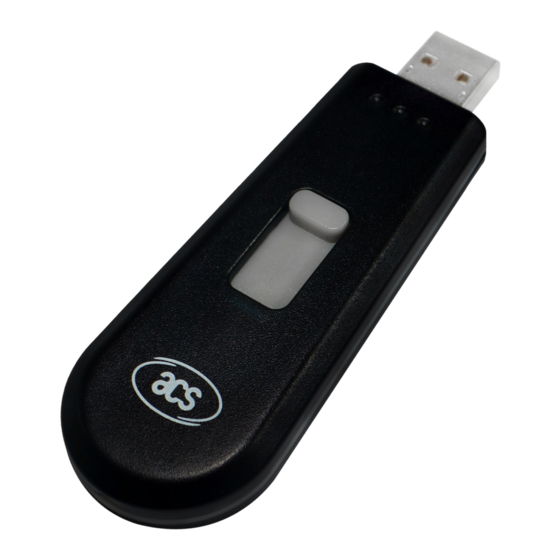
Summary of Contents for ACS ACR1251T
- Page 1 ACR1251T User Manual ACR1251T User Manual V1.00 Subject to change without prior notice info@acs.com.hk www.acs.com.hk...
-
Page 2: Table Of Contents
Table of Contents 1.0. INTRODUCTION ............................ 3 2.0. FEATURES ............................. 4 3.0. ARCHITECTURE ............................. 5 4.0. ACR1251T OPERATING PROCEDURE ..................... 7 4.1......................... 7 RIVER INSTALLATION ROCEDURE 4.2..........................10 PERATION XAMPLE Page 2 of 12 www.acs.com ACR1251T User Manual info@acs.com.hk... -
Page 3: Introduction
1.0. Introduction The ACR1251T is a reader (IFD and PCD) reader which supports contactless (PICC) smart cards. Page 3 of 12 www.acs.com ACR1251T User Manual info@acs.com.hk www.acs.com.hk Version 1.00... -
Page 4: Features
PICC is found. It prevents the PICC from exposing to the field all the time. User-Controllable Peripherals. E.g. LED. PCSC Compliant for Contact and Contactless Interfaces. USB V2.0 Interface. (12M bps) Device Firmware Upgradeable through the USB Interface. Page 4 of 12 www.acs.com ACR1251T User Manual info@acs.com.hk www.acs.com.hk Version 1.00... -
Page 5: Architecture
Controller chip Contactless Interface Carrier Frequency = 13.56MHz PICC Contactless For communication architecture, the protocol between ACR1251T and PC is using CCID protocol. All the communication between PICC is PCSC Compliant. Page 5 of 12 www.acs.com ACR1251T User Manual info@acs.com.hk www.acs.com.hk... - Page 6 ACR1251T PCSC PICC Interface Interface (CCID) PCSC Layer T=CL & T=1 Emulation ACR1251T ISO 14443 Parts 1-4 / ISO 18092 PICC Interface Physical Interface PICC (Built-in Antenna) Page 6 of 12 www.acs.com ACR1251T User Manual info@acs.com.hk www.acs.com.hk Version 1.00...
-
Page 7: Acr1251T Operating Procedure
4.0. ACR1251T Operating Procedure 4.1. Driver installation Procedure Hardware requires: ACR1251T PC with OS window XP or above Software requires: Driver installer “ACS_Unified_PCSC_Driver_Installer_bin-4.0.6.0-20141114_all.zip” Steps: 1. Extract the file “ACS_Unified_PCSC_Driver_Installer_bin-4.0.6.0-20141114_all.zip” 2. Execute “Setup.exe” 3. Below screen will be shown Select the language, then Click “OK”... - Page 8 4. Below screen will be shown, “Next” to continue 5. Below screen will be shown, configure the installation path, then “Next” to continue Page 8 of 12 www.acs.com ACR1251T User Manual info@acs.com.hk www.acs.com.hk Version 1.00...
- Page 9 6. Below screen will be shown, “Install” to continue 7. Waiting until below screen shown Click “Finish” 8. Driver Installation Complete Page 9 of 12 www.acs.com ACR1251T User Manual info@acs.com.hk www.acs.com.hk Version 1.00...
-
Page 10: Operation Example
2. Place the Test Card on the top of the reader about 5cm 3. Open “APDU.exe” 4. Click “1. Select reader”, Chose “ACS ACR1251 CL Reader PICC 0”, then click “OK” 5. Select “T1”, “Stress”, Message = “FF CA 00 00 00”, Interval = “500”... - Page 11 6. Press “Connect” 7. Press “Transmit” to start the testing 8. Below screen will be shown Page 11 of 12 www.acs.com ACR1251T User Manual info@acs.com.hk www.acs.com.hk Version 1.00...
- Page 12 9. Can start the Lab Test Page 12 of 12 www.acs.com ACR1251T User Manual info@acs.com.hk www.acs.com.hk Version 1.00...
- Page 13 FCC Warning: This device complies with part 15 of the FCC Rules. Operation is subject to the following two conditions: (1) This device may not cause harmful interference, and (2) this device must accept any interference received, including interference that may cause undesired operation. Any Changes or modifications not expressly approved by the party responsible for compliance could void the user's authority to operate the equipment. Note: This equipment has been tested and found to comply with the limits for a Class B digital device, pursuant to part 15 of the FCC Rules. These limits are designed to provide reasonable protection against harmful interference in a residential installation. This equipment generates, uses and can radiate radio frequency energy and, if not installed and used in accordance with the instructions, may cause harmful interference to radio communications. However, there is no guarantee that interference will not occur in a particular installation. If this equipment does cause harmful interference to radio or television reception, which can be determined by turning the equipment off and on, the user is encouraged to try to correct the interference by one or more of the following measures: —Reorient or relocate the receiving antenna. —Increase the separation between the equipment and receiver. —Connect the equipment into an outlet on a circuit different from that to which the receiver is connected. —Consult the dealer or an experienced radio/TV technician for help. ...

















Need help?
Do you have a question about the ACR1251T and is the answer not in the manual?
Questions and answers